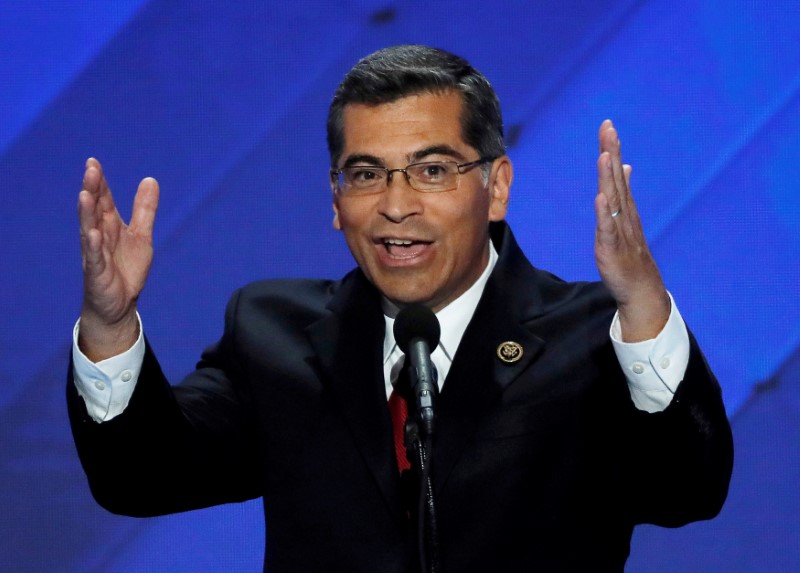By Dan Levine, Lawrence Hurley and Yasmeen Abutaleb
SAN FRANCISCO/WASHINGTON (Reuters) - More than a dozen Democratic attorneys general on Thursday sought to intervene to defend a key part of the Obamacare healthcare law - subsidy payments to insurance companies - which is under threat in a court case.
The 16 attorneys general, led by California Attorney General Xavier Becerra and New York Attorney General Eric Schneiderman, filed a motion to intervene in the case pending in the U.S. Court of Appeals for the District of Columbia Circuit.
The case, which dates back to the Obama administration, was filed by the Republican-led House of Representatives against the federal government in an effort to cut off subsidy payments to insurers for the individual plans created by the Affordable Care Act, often called Obamacare.
The subsidies payments help cover out-of-pocket medical expenses for low-income Americans.
"The stakes are very high. In Maryland we have more than 400,000 people who depend on the Affordable Care Act to get normal healthcare. It sounds alarming, but it's true: lives are at stake," said Maryland Attorney General Brian Frosh, who signed on to the filing.
Trump has repeatedly threatened to withhold the payments to insurers, which amount to about $7 billion this year, and referred to them as a "bailout."
The attorneys general cited in the court filing Trump's own words vowing to let Obamacare "explode" as part of the reasoning for their intervention.
Trump has made it clear he views decisions on health insurance for millions of Americans “as little more than political bargaining chips," the court filing said. The situation is extremely urgent, the Democratic officials argued, because state insurance regulators are making critical choices that will shape their insurance markets for the next year.
Several insurers, including Aetna (N:AET) and Humana (N:HUM), have largely left the Obamacare exchanges, citing a pool of patients who are sicker than expected and therefore more expensive. Insurers have also repeatedly called on the Trump administration to fund the cost-sharing subsidies.
Attorneys general and proponents of Obamacare have said the threats to withhold the payments have already wreaked havoc in the marketplaces and are part of the reason some healthcare consumers have seen double-digit rate increases.
SIGNIFICANT OPPONENTS
Democratic attorneys general have emerged as significant opponents to the Trump administration. They took a lead role to successfully block Trump's executive orders restricting travel from some Muslim-majority countries, and they are also resisting efforts to roll back environmental regulations.
The attorney general from Kentucky, a deeply conservative state, is among those Democrats joining the court filing even as the state's Republican governor has pledged to rollback a Medicaid expansion made possible by Obamacare.
In May 2016, a U.S. judge ruled in favor of the Republicans in the subsidies case, finding that the Obama administration needed explicit congressional approval. The Obama administration appealed before Trump took office, leaving the new administration to ponder how to proceed.
The appeals court put the litigation on hold after the November presidential election at the request of the Republican House lawmakers.
The motion to intervene may not be granted by the court. In February, the same court rejected a similar motion filed by Democratic attorneys general seeking to help defend the Consumer Financial Protection Bureau in a legal battle that could defang the agency.
The litigation could become moot if Congress passes new healthcare legislation to replace Obamacare. The House passed a bill, called the American Health Care Act, earlier this month. The Senate recently began writing its own version of the bill but has warned it could take months to pass.

The Trump administration has taken action over the past several months to undercut Obamacare through regulatory authority. It backed off enforcing the individual mandate, which requires everyone to purchase health insurance or else pay a penalty, tightened enrollment in Obamacare markets and has enabled people to sign up for insurance plans outside of healthcare.gov, the flagship site of Obamacare that the Obama administration heavily advertised.